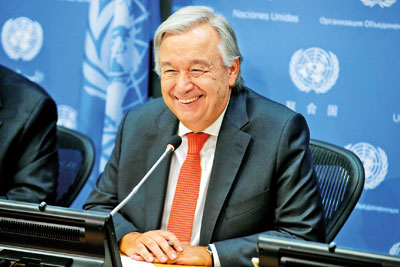Sunday Times 2
Spritzing up the education ecosytem
NEW YORK – This month, heads of state and senior officials from all 193 United Nations member states are gathering in New York City to try to make progress on some of the world’s thorniest development challenges – including ensuring quality education for all. Progress on this front is not just a moral imperative; it is also vital to put countries on the path toward sustainable development. But success will not be easy. It will require significant new investments in local leadership – an element of international development work that has rarely gotten the attention it deserves.

UN Secretary General Antonio Guterres speaks at a news conference ahead of the 72nd United Nations General Assembly at the UN headquarters in New York. REUTERS/Mike Segar
“Leadership,” in this case, doesn’t necessarily mean an individual positioned at the top of a government or business hierarchy. Rather, it is defined by actions aimed at improving a community’s wellbeing, and it can come from anyone. We have seen firsthand how the presence of a diverse set of engaged leaders at all levels – educators, parents, students, policymakers, advocates, and others – can make or break efforts by a community or country to maximise opportunities to improve its education system.
The good news is that educators and education advocates worldwide now seem to be recognising the value of informed local leadership. The International Commission on Financing Global Education Opportunity recently called for greater investment in a “global ecosystem for education” that would help to cultivate more of such leadership. The rest of the international community should heed that call.
A global education ecosystem would comprise new partnerships among bilateral and multilateral donors, the philanthropic community, and global nonprofit organizations. This dynamic network would work with local actors to support leadership development and innovation, while creating efficient new channels for those leaders to share knowledge, experiences, and solutions across communities and countries.
As it stands, this type of education ecosystem doesn’t exist. Instead, almost all of the $17 billion of foreign aid channelled toward education each year goes directly to local governments or local operators. Regional or global organisations that could help develop a global learning infrastructure, support leadership development among local stakeholders, and help create effective channels for knowledge and best-practice transfer among communities, receive no meaningful investment.
That amounts to a wasted opportunity, because the promise of such ecosystems to accelerate overall progress has been proven in other areas – in particular, the public-health sector. Over the last 35 years, driven partly by the global AIDS epidemic, the number of international partnerships and nongovernmental organisations working to promote public health more than quadrupled, to over 200.
Today, the global public-health landscape is populated by numerous NGOs and civil-society organisations, which, along with many public-private partnerships, the UN system, and other intergovernmental organisations, comprise a dynamic network that facilitates progress. This mature, if imperfect, ecosystem has almost certainly helped to improve and even save the lives of millions of people around the world.
One organisation that is helping to support the public-health ecosystem’s continued development is Results for Development, which leads the Joint Learning Network for Universal Health Coverage. By establishing and deepening connections that enable practitioners and policymakers from countries around the world to share their experiences and expertise with their counterparts elsewhere, the Joint Learning Network is helping to ensure that we make progress toward improved health-care coverage worldwide faster than would otherwise be the case.
This is precisely the kind of approach that is needed to advance the international community’s goal of ensuring quality education for all. Given remarkable similarities in the causes of the inequities and challenges affecting education across communities and countries, knowledge-sharing among local leaders – not to mention effective capacity-building – promises to be as effective as it has been in the health sector. We simply need a global education ecosystem to support such efforts – and we need it as quickly as possible.
This month’s UN General Assembly meetings present an important opportunity to kick-start this endeavour. If we increase current multilateral investment in regional and global nonprofit education actors by even a small amount, the world could begin to develop a shared ecosystem to foster local innovation, learning, leadership development, and capacity building. And we would significantly increase our odds of achieving the progress on education – and our collective welfare – that all of us seek.
(Wendy Kopp is the CEO and co-founder of Teach For All. Dzingai Mutumbuka is former Minister of Education for Zimbabwe and Chair of the Association for Education Development in Africa.)Copyright: Project Syndicate, 2017.www.project-syndicate.org

